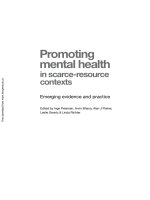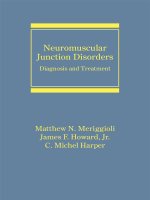HANDBOOK OF PRESCHOOL MENTAL HEALTH Development, Disorders, and Treatment ppt
Bạn đang xem bản rút gọn của tài liệu. Xem và tải ngay bản đầy đủ của tài liệu tại đây (4.6 MB, 449 trang )
HANDBOOK OF PRESCHOOL MENTAL HEALTH
HANDBOOK OF
PRESCHOOL MENTAL HEALTH
Development, Disorders, and Treatment
Edited by
JOAN L. LUBY
THE GUILFORD PRESS
New York London
© 2006 The Guilford Press
A Division of Guilford Publications, Inc.
72 Spring Street, New York, NY 10012
www.guilford.com
All rights reserved
No part of this book may be reproduced, translated, stored in
a retrieval system, or transmitted, in any form or by any means,
electronic, mechanical, photocopying, microfilming, recording,
or otherwise, without written permission from the Publisher.
Printed in the United States of America
This book is printed on acid-free paper.
Last digit is print number:987654321
Library of Congress Cataloging-in-Publication Data
Handbook of preschool mental health : development, disorders, and treatment /
edited by Joan L. Luby.
p. ; cm.
Includes bibliographical references and index.
ISBN-13: 978-1-59385-313-6 (alk. paper)
ISBN-10: 1-59385-313-0 (alk. paper)
1. Child psychiatry—Handbooks, manuals, etc. 2. Preschool children—
Mental health—Handbooks, manuals, etc.
[DNLM: 1. Mental Disorders—physiopathology. 2. Child Development.
3. Child Psychology. 4. Child, Preschool. 5. Mental Disorders—therapy.
WS 350 H23597 2006] I. Luby, Joan L.
RJ499.H36 2006
618.92′89—dc22
2006000352
“For Warmth” reprinted from Call Me by My True Name (1999) by Thich Nhat Hanh
with permission of Parallax Press, Berkeley, California, www.parallax.org.
To my parents, Elliot and Ideane Luby,
who, with tremendous love and generosity,
helped me to realize my intellectual dreams
About the EditorAbout the Editor
About the Editor
Joan L. Luby, MD, is an infant/preschool psychiatrist and Associate Professor
of Child Psychiatry at the Washington University School of Medicine in
St. Louis, where she is the founder and director of the Early Emotional Devel
-
opment Program. This clinical and research program focusing on mood
disorders in preschool children was the first of its kind nationally. Dr. Luby
has been awarded grants from the National Institute of Mental Heath and the
National Alliance for Schizophrenia and Depression, which have supported
her research on the phenomenology of early-onset mood disorders. She
currently chairs the Infancy Committee of the American Academy of Child
and Adolescent Psychiatry and serves on several scientific advisory groups fo-
cused on the development of age-appropriate diagnostic criteria for preschool
disorders.
vii
ContributorsContributors
Contributors
Thomas F. Anders, MD, Department of Psychiatry and Behavioral
Sciences, University of California, Davis, M.I.N.D. Institute,
Sacramento, California
Adrian Angold, MRCPsych, Center for Developmental Epidemiology,
Department of Psychiatry and Behavioral Sciences, Duke University
Medical Center, Durham, North Carolina
Andy C. Belden, PhD, Department of Child Psychiatry, Washington
University School of Medicine, St. Louis, Missouri
Anne Leland Benham, PhD, Department of Psychiatry and Behavioral
Sciences, Stanford University School of Medicine, Palo Alto, California
Somer L. Bishop, MA, Department of Psychology, University of Michigan,
Ann Arbor, Michigan
Melissa M. Burnham, PhD, Department of Human Development and
Family Studies, University of Nevada, Reno, Reno, Nevada
Irene Chatoor, MD, Department of Psychiatry and Pediatrics, George
Washington University, and Children’s National Medical Center,
Washington, DC
Brent R. Collett, PhD, Department of Psychiatry and Behavioral Sciences,
University of Washington School of Medicine, and Children’s Hospital
and Regional Medical Center, Seattle, Washington
Geraldine Dawson, PhD, Department of Psychology and University of
Washington Autism Center, University of Washington, Seattle,
Washington
Susanne A. Denham, PhD, Department of Psychology, George Mason
University, Fairfax, Virginia
ix
Helen Link Egger, MD, Center for Developmental Epidemiology and
Department of Psychiatry and Behavioral Sciences, Duke University
Medical Center, Durham, North Carolina
Susan Faja, MS, Center on Human Development and Disabilities,
University of Washington, Seattle, Washington
Erika E. Gaylor, PhD, Center for Education and Human Services, Policy
Division, SRI International, Menlo Park, California
Rebecca Goodvin, MA, Department of Psychology, University of Nebraska,
Lincoln, Nebraska
Amy K. Heffelfinger, PhD, Departments of Neurology and Neurosurgery,
Medical College of Wisconsin, Milwaukee, Wisconsin
Audrey Kapilinsky, LCSW, Child Development Center, University of
California, Irvine, Irvine, California
Deepa Khushlani, MD, Department of Psychiatry and Behavioral Medicine,
Children’s National Medical Center, Washington, DC
Ron Kotkin, PhD, Department of Pediatrics and Child Development
Center, University of California, Irvine, Irvine, California
Marc Lerner, MD, Department of Pediatrics, University of California,
Irvine, Irvine, California
Alicia F. Lieberman, PhD, Department of Psychiatry, University of
California, San Francisco, San Francisco, California
Catherine Lord, PhD, Department of Psychology and Psychiatry, University
of Michigan Autism and Communication Disorders Center,
Ann Arbor, Michigan
Joan L. Luby, MD, Department of Psychiatry, Washington University
School of Medicine, St. Louis, Missouri
Jon M. McClellan, MD, Department of Psychiatry and Behavioral Sciences,
University of Washington School of Medicine, and Children’s Hospital
and Regional Medical Center, Seattle, Washington
Sara Meyer, MA, Department of Psychology, University of California,
Davis, Davis, California
Christine Mrakotsky, PhD, Department of Psychiatry, Harvard Medical
School, and Children’s Hospital Boston, Boston, Massachusetts
Carol M. Rockhill, MD, PhD, Department of Psychiatry and Behavioral
Sciences, University of Washington School of Medicine, Seattle,
Washington
Michael S. Scheeringa, MD, MPH, Institute of Infant and Early Childhood
Mental Health and Department of Psychiatry and Neurology, Tulane
University School of Medicine, New Orleans, Louisiana
x Contributors
Carol Fisher Slotnick, MSW, PhD, Department of Psychiatry and
Behavioral Sciences, Stanford University School of Medicine, Palo
Alto, California
Matthew L. Speltz, PhD, Department of Psychiatry and Behavioral
Sciences, University of Washington School of Medicine, and Children’s
Hospital and Regional Medical Center, Seattle, Washington
Brian S. Stafford, MD, MPH, Department of Pediatrics and Child
Psychology, Denver Children’s Hospital, and The Kempe Center,
Denver, Colorado
Robin Steinberg-Epstein, MD, Department of Pediatrics, University of
California, Irvine, Irvine, California
Kenneth W. Steinhoff, MD, UCI Child Development Center, University of
California, Irvine, Irvine, California
James M. Swanson, PhD, UCI Child Development Center, University of
California, Irvine, Irvine, California
Ross A. Thompson, PhD, Department of Psychology, University of
California, Davis, Davis, California
Patricia Van Horn, PhD, Department of Psychiatry, University of
California, San Francisco, San Francisco, California
Sharon Wigal, PhD, Department of Pediatrics, University of California,
Irvine, Irvine, California
Tim Wigal, PhD, Department of Pediatrics, University of California,
Irvine, Irvine, California
Charles H. Zeanah, MD, Department of Psychiatry and Pediatrics, Tulane
University, New Orleans, Louisiana
Contributors xi
PrefacePreface
Preface
For Warmth
I hold my face between my hands
no I am not crying
I hold my face between my hands
to keep my loneliness warm
two hands protecting
two hands nourishing
two hands to prevent
my soul from leaving me
in anger.
—T
HICH NHAT HANH
In so few words, this poem beautifully captures what is so vital about early
emotional development and its importance in the human condition. It is the
willingness and ability to embrace fully and experience the broad spectrum of
emotional states, including those that are painful and distressing, that may be
key to mental health and adaptive personal development. As psychoanalytic
theory has suggested for decades, by achieving this emotional developmental
capacity, one gains the ability to have a clear view of oneself and others, and
to engage fully and honestly in the human experience and all of its vicissi
-
tudes. Guiding young children’s development in this area early in life could be
as empowering as learning to walk or talk. However, because of its intangible
quality and our own limited mastery of this as adults, this goal has eluded us
thus far.
This volume aims to discuss early-onset mental disorders in preschool-age
children from a fundamentally developmental perspective. To achieve this goal,
the first section of the book is devoted to a review of the available empirical de
-
velopmental literature pertaining to those areas that have a direct relevance to
mental disorders. This includes a review ofnew data on thedevelopment of self-
concept (Chapter 1), emotions and socialization (Chapter 2), and cognition
(Chapter 3). There are surprising gaps in the developmental literature on many
basic elements of the development of emotions, although key elements of the
xiii
available literature inthis area are reviewedin Chapter 10 onmood disorders as
they pertain to our understanding of normative and aberrant affectearlyinlife.
Although child mental health providers would agree in principle that a
fundamental knowledge of normative development is essential to practice,
this is often given short shrift in training and in clinical application. When de
-
velopmental principles are applied, they tend to be anecdotal, informal, and
therefore inexact. As we attempt to identify mental disorders in younger and
younger populations, a more detailed knowledge of these elements becomes
essential as we aim to differentiate clinically significant problems from the
normative and transient emotional and behavioral extremes and difficulties of
early development.
Over the last decade, significant progress has been made in the under
-
standing of mental disorders in preschoolers, who range in age from 3 to 6
years, while much has been known about children older than 6 for some time.
Part II provides a comprehensive review of the available empirical findings for
each diagnostic category in which a substantial body of data was found.
Chapters 6 and 9 on eating and sleeping disorders, respectively, give an up-to-
date and clinically pragmatic account of how these problems that cross the
clinical threshold present in the preschool period. Chapters 7 and 10 on anxi-
ety and mood disorders, respectively, as well as Chapter 8 on posttraumatic
stress disorder (PTSD), review the empirical database. Work on mood disor-
ders and PTSD has achieved considerable momentum in the area of validation
and clarification of age-adjusted symptoms.
There is a substantial body of work on the identification of autism spec-
trum disorders in the preschool period, which is the latest developmental pe-
riod that one should aim to capture these disorders. New empirical findings
have emerged on preschool attention-deficit/hyperactivity disorder from a
multisite treatment study (see Chapter 4). These findings are useful to inform
both diagnosis and treatment. These chapters are designed to be of use to cli
-
nicians of all disciplines as a source of information on how to diagnose prop
-
erly and begin to formulate treatment strategies for very-early-onset disor
-
ders.
Although the area of specific treatments for preschool disorders remains
a largely empirically unexplored area, the chapters contained in Part III re
-
view the state of our knowledge of treatment modalities specifically designed
for preschoolers. Areas covered range from dyadic play therapies (Chapters
15 and 16) to psychopharmacology (Chapter 14). Chapters focus on the theo
-
retical (e.g., play therapy) to highly empirical (e.g., treatment of autism spec
-
trum disorders; Chapter 17), varying with the available data base specific to
each diagnostic area.
Chapter 14 on psychopharmacology broadly reviews the scant available
empirical studies as they apply to the range of conditions identified and
treated in young children. Given the substantial gaps in the literature, the
chapter outlines recommendations for future research. Basic guidelines and
principles for the prescribing physician are also offered to help inform clinical
xiv Preface
decision making in this area in which there is substantial social pressure on
the physician to prescribe in the absence of empirical data to guide these
treatment decisions. Part III also includes Chapter 13 on neuropsychological
assessment of preschool-age children. This is a developing area, with new,
age-specific assessment methods that may serve as a useful adjunct to a diag
-
nostic assessment.
Whereas the chapters presented in this volume are of obvious use to clini
-
cians and researchers who focus on young children, the principles outlined
may also be useful and applicable for practitioners who assess and treat men
-
tal disorders across the lifespan. In particular, the developmental perspective
can be used to formulate more informed hypotheses about etiologies and may
also be surprisingly useful to assess adaptive functioning in individuals across
the age range. In this way, they may also be applicable to prevention and per
-
sonal growth models.
The Buddhist spiritual leader and author Thich Nhat Hanh, and others
like him, serve as a model for individuals seeking greater emotional sentience,
as well as for those seeking relief from emotional suffering. I am grateful and
humbled by my own experiences of suffering, which I continue to try “to
keep warm.” As his gracefully crafted words convey, the practice of fully ex-
periencing and simultaneously regulating a broad array of appropriate emo-
tions is important, because it enhances one’s ability to experience joy in all its
intensity, as joy emerges from anguish (as one example), and in this way to
participate fully in and enjoy human relationships. These principles have also
helped me to have a clearer view of emotions, their range and repertoire, and
to apply this view to my own area of interest, early-onset mood disorders. I
believe it is important to keep our loneliness “warm”—as Thich Nhat Hanh
suggests, to stay in touch with but not become overwhelmed by loneliness and
emotions like it—for balance and understanding to help us identify, tolerate,
experience, and modulate these emotions in our children and ourselves.
I hope that this book will be useful to clinicians, developmentalists, and
researchers interested in young children. The field of preschool mental health
has made substantial progress as advances in our understanding of early de
-
velopment have emerged. The greater awareness of the emotional and cogni
-
tive capacities of the young child has opened the door for clinicians and re
-
searchers to design age-appropriate approaches to tap internal emotional
states in preverbal children. Subsequent findings reviewed in this volume,
demonstrating an even earlier onset of many mental disorders than previously
recognized, hold promise for investigations of early and potentially more ef
-
fective intervention. Whereas such advances are welcome news for preschool
children, and alone would likely gratify those of us committed to that popula
-
tion, they may also hold promise for impacting the trajectory of mental disor
-
ders across the lifespan. It is tremendously exciting and gratifying that the
field of preschool mental health has made sufficient progress to fill an edited
volume of this size.
Preface xv
ContentsContents
Contents
Part I. Normative Development in the Preschool Period
1 Social Development: Psychological Understanding, Self-Understanding,
and Relationships
3
Ross A. Thompson, Rebecca Goodvin, and Sara Meyer
2 Emotional Competence: Implications for Social Functioning 23
Susanne A. Denham
3 Cognitive Development 45
Amy K. Heffelfinger and Christine Mrakotsky
Part II. Mental Disorders Arising in the Preschool Period
4 Attention-Deficit/Hyperactivity Disorder 63
Kenneth W. Steinhoff, Marc Lerner, Audrey Kapilinsky,
Ron Kotkin, Sharon Wigal, Robin Steinberg-Epstein,
Tim Wigal, and James M. Swanson
5 Oppositional Defiant Disorder 80
Carol M. Rockhill, Brent R. Collett, Jon M. McClellan,
and Matthew L. Speltz
6 Eating Disorders 115
Irene Chatoor and Deepa Khushlani
7 Anxiety Disorders 137
Helen Link Egger and Adrian Angold
8 Posttraumatic Stress Disorder: Clinical Guidelines and Research Findings 165
Michael S. Scheeringa
9 Sleep Disorders 186
Melissa M. Burnham, Erika E. Gaylor, and Thomas F. Anders
xvii
10 Mood Disorders: Phenomenology and a Developmental Emotion Reactivity Model 209
Joan L. Luby and Andy C. Belden
11 Attachment Disorders 231
Brian S. Stafford and Charles H. Zeanah
12 Autism Spectrum Disorders 252
Somer L. Bishop and Catherine Lord
Part III. Assessment and Intervention in the Preschool Period
13 Neuropsychological Assessment 283
Christine Mrakotsky and Amy K. Heffelfinger
14 Psychopharmacology 311
Joan L. Luby
15 Play Therapy: Integrating Clinical and Developmental Perspectives 331
Anne Leland Benham and Carol Fisher Slotnick
16 Using Play in Child–Parent Psychotherapy to Treat Trauma 372
Patricia Van Horn and Alicia F. Lieberman
17 Early Intervention for Autism 388
Susan Faja and Geraldine Dawson
Index 417
xviii Contents
Part I
Normative Development
in the Preschool Period









